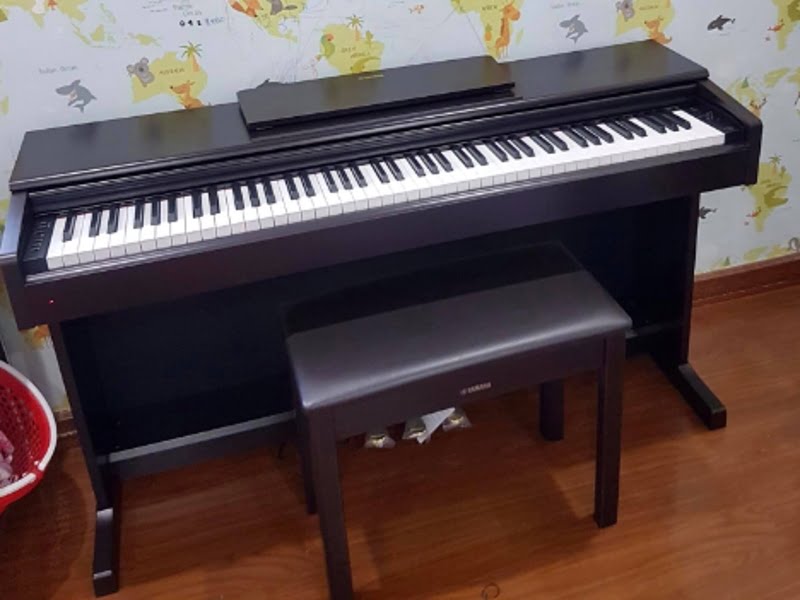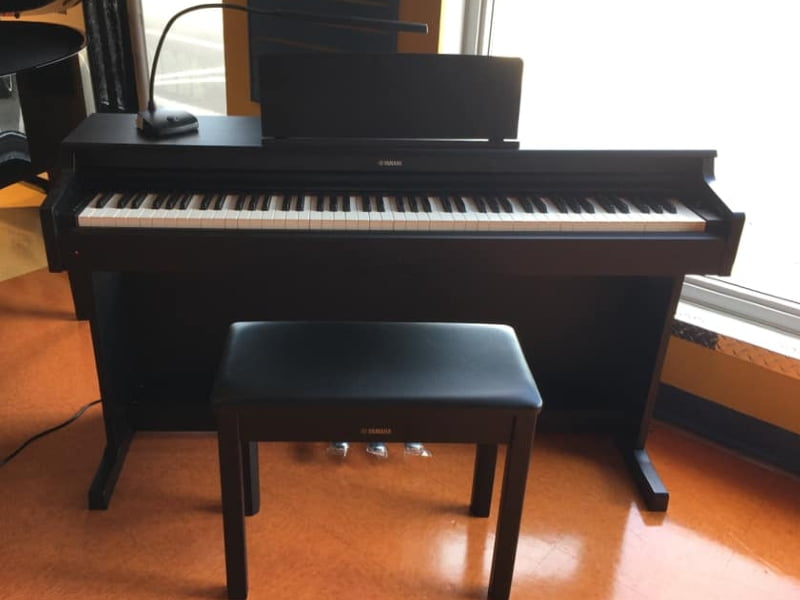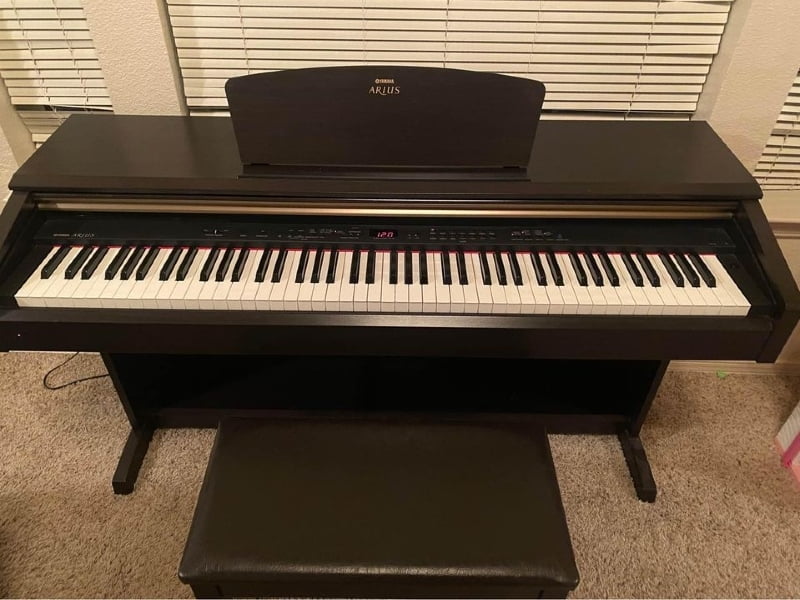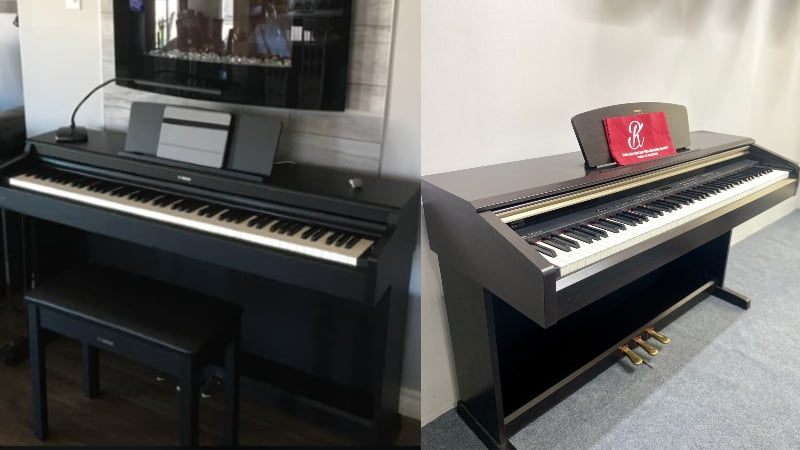How much better is the Yamaha YDP-144 than its predecessors? Find out everything you need to know in this Yamaha YDP-144 vs YDP-181 comparison.
When it originally launched, the Yamaha Arius series took the world by storm. But as you’re about to see, the newer Yamaha Arius models are miles ahead of the first set of console pianos Yamaha released.
A great example of this is my Yamaha YDP-144 vs YDP-181 comparison, which I’ll detail a bit more below.
Basically, the YDP-144 is one of the newer models in the Arius series, while the YDP-181 was one of the first models in the Arius series. And even if the YDP-181 was considered one of the best options in the Arius collection upon its release, the YDP-144, which is in the mid-range of the new Arius collection, is much better.
The YDP-144 comes with better hammer action, polyphony, and tones. So, if you’re trying to find the best Yamaha Arius piano for you, the YDP-144 will serve you much better than the YDP-181.
Below, I’ll get into all the details of this comparison and explain what makes the YDP-144 different from the YDP-181. And by the end, you’ll be able to see which piano is best suited to your needs!
Yamaha YDP-144 vs YDP-181: Comparison Chart




Last update on 2024-07-25 / Affiliate links / Images from Amazon Product Advertising API
Yamaha YDP-144 vs YDP-181: A Head-to-Head Comparison
I compared these two pianos based on the three most important qualities of any digital piano: the tone, feel, and polyphony. I’ve found in my experience that these are the characteristics that really make a digital piano, and they are arguably the three aspects you need to consider the most when buying one for yourself.
In this comparison, the Yamaha YDP-144 won the point for every category. At the end of the comparison, the score was 3-0 in favor of the YDP-144, which shows how much Yamaha has improved in recent years and why you should consider always going for the more updated model when shopping for digital pianos.
In the sections below, I’ll detail exactly how the Yamaha YDP-144 won all the comparison points so you can see why it’s the better piano.
Tone
The winner: Yamaha YDP-144
The first characteristic I focused on was the tone. Your top priority when buying a digital piano should be finding a model with realistic and high-quality piano tones. And between the YDP-144 and the YDP-181, the winner was clear.
The Yamaha YDP-144 only comes with 10 voices, but they all compete with some of the most expensive digital pianos on the market. And even if the YDP-181 comes with more tones, it fell short of the YDP-144 because none of the 14 voices on the YDP-181 could compete with the Yamaha.

+Tone Generation
The Yamaha YDP-181 uses the tone generator that was considered the best available option upon its release. This is Yamaha’s AWM Stereo Sampling method that shook the world when it launched. Unlike other sample-based tone engines of the time, AWM uses stereo samples that contain much more data and produce more detailed voices.
This is why the YDP-181 was by far the most realistic-sounding digital piano when it was launched. However, a lot of time has passed since then, which has allowed Yamaha to develop even higher-quality tone generators.
That’s why you can find the Yamaha CFX, one of the brand’s most advanced tone engines, on the YDP-144. This tone engine derives all its piano sounds from Yamaha CF Grand Pianos and you can rest assured that Yamaha also used some of the best equipment available to capture the sound.
So, whenever you press a key on the YDP-144, you will hear a crisp, detailed, and realistic piano tone. While the YDP-181 produces some decent tones, it doesn’t compare with the detail in the YDP-144, which is why I gave the YDP-144 a point for this category.
+Sound Library
One thing you need to know about digital console pianos like the YDP-144 and the YDP-181 is that they aren’t designed to play many sounds. Instead, they are made to replicate the sound of a real acoustic piano as best as possible, so they don’t come with the most varied sound libraries.
The YDP-144 and the YDP-181 only come with 10 and 14 voices, respectively. The YDP-144 has fewer voices than the 181, but both models allow you to choose between a few piano voices, organ, electric piano, and string sounds.
This is all you will need as a beginner and novice pianist. In fact, even professional musicians will be more than happy to have these options. However, the 14 voices on the YDP-181 sound fairly digital and dated, while the 10 voices on the YDP-144 are some of the highest-quality and most detailed digital piano voices you will find.
Feel
The winner: Yamaha YDP-144
The next feature I looked at was the feel. And even if the Yamaha YDP-181 has decent hammer action, the technology is dated and doesn’t feel as realistic as modern options. On the other hand, the YDP-144 comes with some of the best hammer action available in this price range.
So, it was pretty clear that the YDP-144 deserved the point for this category.

+Hammer Action
It’s imperative that you closely analyze the hammer action of your digital piano. This is the main factor determining how realistic the piano feels and whether it can come close to a real acoustic piano.
The Yamaha YDP-181 comes with Graded Hammer action. Again, this was the best hammer action system that Yamaha had to offer at the time and is, undoubtedly, very realistic. However, the Graded Hammer Standard action that comes with the YDP-144 is now considered the best hammer action system available, and it’s very easy to see why.
The Graded Hammer Standard offers a more realistic weight and spring back while still capturing the subtle differences between the lower keys and higher keys. When I tested out both pianos, there was no doubt that the Yamaha YDP-144 felt way more realistic, so I had no choice but to award it another point.
Polyphony
The winner: Yamaha YDP-144
The last feature I considered was polyphony. And between these two pianos, the Yamaha YDP-144 comes out on top yet again.
The Yamaha YDP-181 comes with 128-note polyphony. Back then, this was considered top-tier. But nowadays, the 128-note polyphony is seen as the standard for most digital pianos. While you can play almost any piano piece written with this polyphony, you are limited whenever you try to leave the sustain pedal on or play dense chords.
On the flip side, the Yamaha YDP-144 features 192-note polyphony. This is a great and very important feature as it gives you more flexibility when playing. With 192-note polyphony, you can be expressive by playing with the sustain pedal, mixing different voices together, and opening up way more opportunities with your digital piano.
So, yet again, the Yamaha YDP-144 comes out with the point. This means the final score was 3-0 in favor of the YDP-144, which isn’t unexpected since the Yamaha YDP-144 is the newer version that comes with the best features Yamaha has to offer.

Yamaha YDP-144 vs YDP-181: The Similarities
There are quite a few similarities between the YDP-144 and YDP-181. After all, these pianos come from the same product line. For example, these are two console digital pianos designed to provide players with the most realistic experience possible.
These pianos are great options for those that are looking for a home piano or something to keep at their performance venue. While they are bulky, you get a bit more realism and a higher-quality sound, making them worth the investment.
Additionally, these pianos have a fairly limited selection of sounds. This is definitely on purpose, as the limited sound library allowed the brand to install better samples in the pianos, which is why they can both offer very realistic and crisp piano tones.
That said, since the YDP-144 is the newer option, it offers crisper tones and a slightly more realistic feel. Despite their similarities, it’s crystal clear that the YDP-144 is the more versatile pick between the two.
Quick Rundown of the Yamaha YDP-144
- Your purchase includes One Yamaha Arius Series, YDP144 model | Bench, 50 Classical Music Masterpieces Book, Owner’s manual & Quick Operation Guide
- Piano dimensions – 53-7/16” W x 32-1/16” H x 16-5/8” | Weight – 83 lbs. | Number of pedals – 3 | Max polyphony – 192 | Number of voices – 10 | Headphones – (2) Standard Stereo phone jack | With Recording and Playback capabilities
- GHS weighted action is heavier in the low keys and lighter in the high keys, just like an acoustic piano
- Half-damper pedal control allows for continuously increasing amounts of sustain as the pedal is depressed
- The CFX Premium Grand Piano Voice recreates the power and tone of the flagship CFX concert grand piano from Yamaha
Last update on 2024-07-25 / Affiliate links / Images from Amazon Product Advertising API
Quick Rundown of the Yamaha YDP-181
- 88-key GH(Graded Hammer) weighted action keyboard
- Dynamic Stereo Sampling AWM piano with 128-note polyphony
- 2-track, 3-song recorder
- USB TO DEVICE port
- LED Display.Tempo Range:32-280
Last update on 2024-07-25 / Affiliate links / Images from Amazon Product Advertising API
Product Video
Related Articles to Yamaha Ydp 144
- Yamaha YDP144 vs YDP-144R: What’s the Difference?
- Yamaha YDP-144 vs YDP-S54: What’s the Difference?
- Yamaha YDP-144 vs 184: Which Is the Best Arius Model for the Money?
- Yamaha YDP-144 vs Roland F-140R: Which Digital Piano Do You Need?
- Yamaha YDP-144 vs Kawai KDP-120: Which Piano Is the Best?
- Yamaha YDP-144 vs Kawai KDP-110: Why the YDP-144 Is the Better Piano
- Yamaha YDP-144 vs 164: Which Is the Better Arius Piano?
- Yamaha DGX-660 vs YDP-144: Which Is the Better Yamaha Piano?
- Yamaha DGX-670 vs YDP 144: Finding the Best Digital Piano
- Yamaha YDP144 vs 163: Which Is The Best Arius?
- Yamaha YDP144 vs S34: Which Suits Your Style Better?
- Yamaha YDP-143 Vs 144: Is The YDP-144 A Worthy Upgrade?
- Yamaha YDP-103 Vs 144: A Battle Of Two Arius Models
- Casio PX-870 Vs Yamaha YDP-144: Which Is The Better Console Digital Piano?
- Casio PX-770 vs Yamaha YDP-144: Which Is The Better Digital Piano?
References:
- Yamaha YDP-144: https://usa.yamaha.com/products/musical_instruments/pianos/arius/ydp-144/specs.html#product-tabs
- Yamaha YDP-181: https://usa.yamaha.com/products/musical_instruments/pianos/arius/ydp-181/specs.html
Lulacruza is an electronic folk duo operating at the junction of the hypermodern and the ancient. Our music weaves together hypnotic female singing, South American folk instruments and electronic processing, while channeling pulsating waves from the source of creation.
Lalucruza is also a community where you can connect with other music lovers to collaborate, exchange ideas and share knowledge. A platform for who wants to learns the basics of playing piano, guitar, drum masters’ technique, etc.. is the premise of our website.
